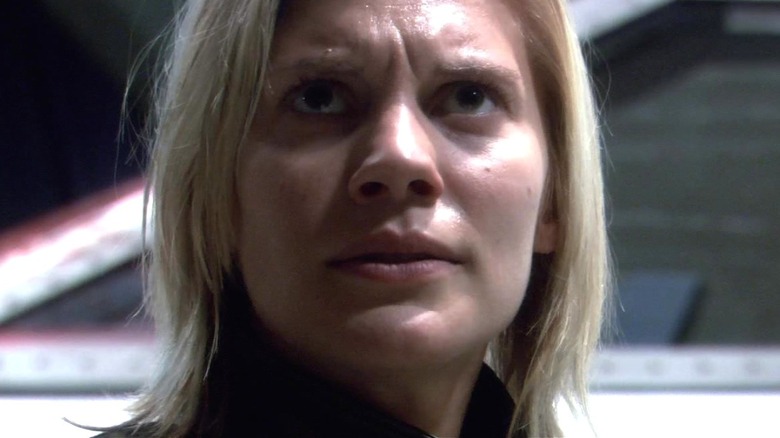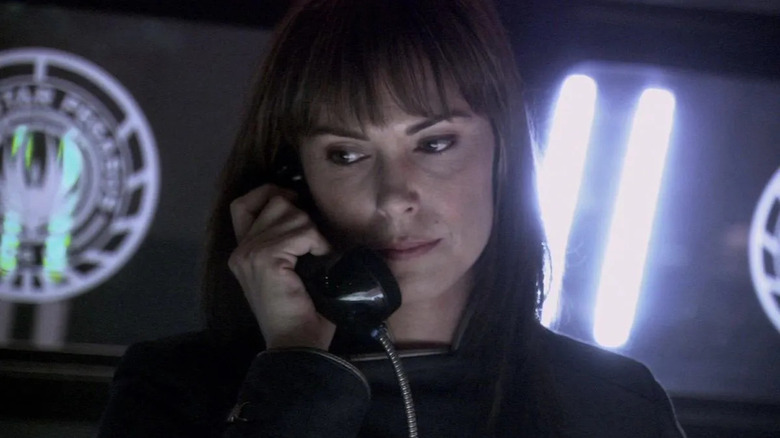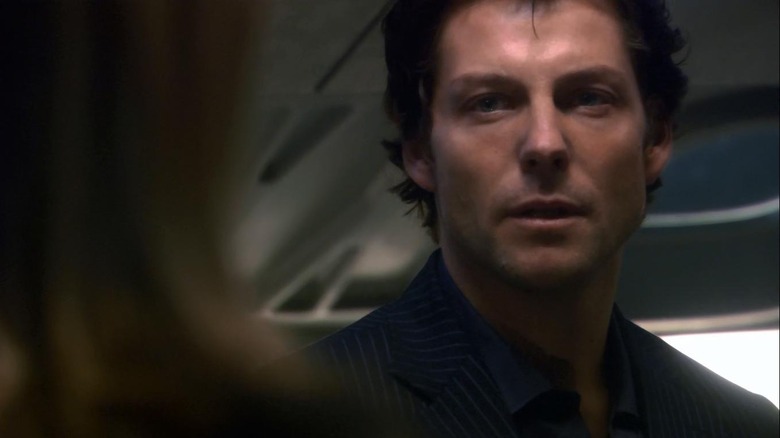How The Ending Of Battlestar Galactica Ruined The Show According To Fans
The reimagined version of "Battlestar Galactica" premiered all the way back in 2004, and quickly took the television landscape by storm. The show – known for its mish-mashing of genres, covering everything from military science fiction to political drama all the way to the well-established tropes of space operas – tells the story of the last remnants of humanity trying to escape the murderous androids that they created. "Battlestar Galactica" premiered during an era of television that saw an increase in grittier and more serialized storylines, especially on basic cable networks like Syfy and AMC, and it was often hailed as one of the prime examples of this paradigm shift.
The series maintained its popularity throughout four seasons, often achieving critical and fan acclaim in equal measure. However, by the middle of Season 3, as argued by Gizmodo, some critics and fans started to turn on the show due to its increasingly strange and seemingly random plot twists. In fact, there's a whole subsection of fans who believe that the final episode of the show may have ruined the entire series altogether, and there are a few pivotal reasons why they claim this to be the case.
Battlestar Galactica thought the finale went too mystical
Over on Reddit — on a thread talking about shows that were once great, but which had endings that were bad enough to ruin the whole thing – u/Badloss brought up "Battlestar Galactica." They said that while the depiction of humans coping with tragedy and the potential extinction of their species was riveting television in the early seasons, the later seasons devolved into overwrought mysticism by the showrunners, who seemingly didn't have an endgame in mind when they launched the narrative. Another (now deleted) user, expanded on this point by saying, "BSG's finale makes it clear that they simply didn't plan the show out.
u/Datathrash said that they appreciated how religious themes of the show added to the sense of realism in early seasons, but hated how these elements took over the plot by Season 4, to the point where certain characters were depicted as literal angels — which was, clearly, a controversial TV twist that people are still talking about.
Reddit isn't the only place you'll find people complaining that "Battlestar Galactica" suffered from a downward trend in its last season, though, and in fact, it seems that this general feeling of disappointment with the ending of "Battlestar Galactica has only grown over the years since the series went off the air, with one particular critic being one of the foremost authors of the present day.
Critics slammed the finale
George R.R. Martin of "Game of Thrones" fame is one of the biggest authors today, and while he was a fan of "Battlestar Galactica" he also took to his blog to criticize how it ended, in a post ominously titled "Writing 101." His primary issue came down to the deux ex machina explanation, or as Martin wrote, "['Battlestar Galactica'] ends with 'God Did It.' Looks like somebody skipped Writing 101, when you learn that a deus ex machina is a crappy way to end a story." These thoughts were mirrored by Cinema Blend's analysis of the ending, which lambasted the show for having Starbuck (Katee Sackhoff) reappear (following the discovery of her corpse in Season 3) and then disappear at the end of the finale, with no explanation outside of godly interference.
Time pointed out the absurdity of such an advanced people ridding themselves of technology, medicine, and so on in order to start over on Earth as hunter-gatherers, after barely surviving a brutal war. Salon believed that the episode was so incredibly different from the rest of the series, essentially betraying what had made the show so special in the first place. In a retrospective piece, Entertainment Weekly opined that such a bad ending damaged "Battlestar Galactica" and its potential legacy.
Showrunner Ronald D. Moore defended the ending during an interview with Vulture, but he acknowledged that a lot of fans were unhappy. In 2020, he told Collider that the original version of "Daybreak" was closer to four hours in length and was more non-linear. It's hard not to wonder how fans would have responded to such a finale, especially if it ultimately added more context to the events that happened.


